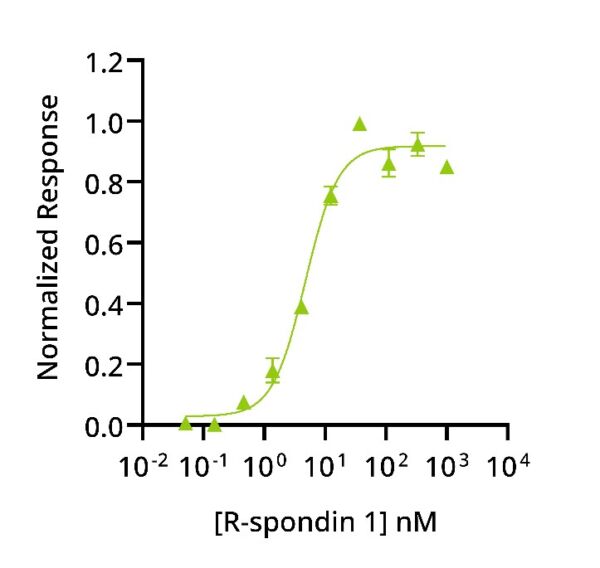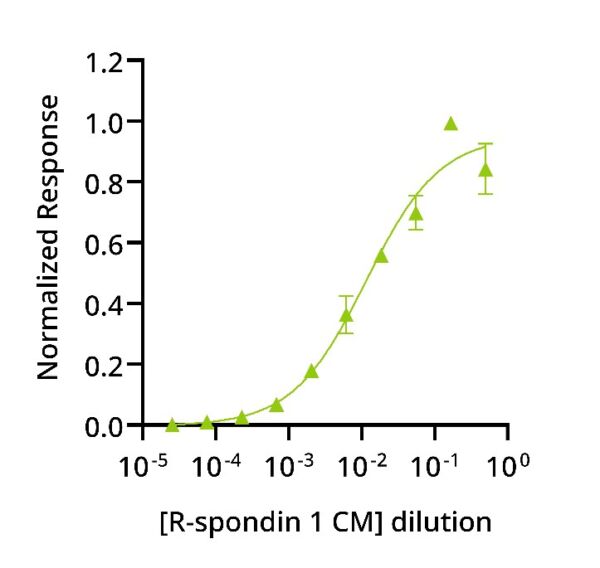Comparison of recombinant human R-spondin 1 bioactivity (Qk006) to CSC1 R-spondin 1 conditioned media bioactivity
In collaboration with the the Duque-Correa group, Cambridge Stem Cell Institute (CSCI).
Human R-spondin 1 protein (RSPO1) is the prototypic member of the R-spondin family. R-spondin 1 is used to potentiate Wnt signaling in many organoid culture systems. Conditioned media from R-spondin 1 expressing cell lines is a common source of R-spondin 1, however, conditioned media is a major source of intra- and inter-lab variability. Recombinant proteins can provide a low variability alternative to conditioned media.
This technote describes the comparison of bioactivity between Qkine recombinant R-spondin 1 (Qk006) and R-spondin 1- conditioned media from the CSCI. The TopFlash assay used for R-spondin 1 testing uses a luciferase reporter that contains a minimal fos promoter coupled to TCF-binding sites upstream of a firefly luciferase gene.
Method
HEK293 cells were plated in 96-well plates and transfected with the TopFlash firefly luciferase reporter construct and the pRL-TK reporter construct which provides constitutive expression of Renilla luciferase. 24h post-transfection, Qkine R-spondin 1 #204511 25 μg was reconstituted in 25 μl 10 mM HCl, and the concentration determined using A280. A dilution series of Qkine R-spondin 1 was constructed in 1x Wnt-conditioned media, starting at 1 µM. A dilution series of CSCI R-spondin 1- conditioned media was constructed, and the dilutions were further diluted 1:1 in 2x Wnt-conditioned media. The highest concentration is therefore a 0.5 dilution of the stock supplied.
Diluted samples were incubated with transfected cells in triplicate for 18h, and then the cells were lysed and analysed for Firefly and Renilla luciferase activity. Firefly/Renilla luciferase ratios were calculated for each well, and then the results were plotted and fit to a 4-parameter logistic equation to derive EC50s.
Bioassay results
A

B

Bioactivity of Qkine recombinant R-spondin 1 (A) and CSCI R-spondin 1-conditioned media (B). Data have been normalised to the maximum response in each dataset.
The EC50 of Qkine R-spondin 1, as measured in this assay (A) was 4.75 nM (59 ng/ml). The EC50 of CSCI R-spondin 1-conditioned media (B) was a dilution of 0.011 (approximately 1:100 dilution of the original stock supplied).
A 1:10 dilution of CSCI R-spondin 1-conditioned media (used at the CSCI) would equate to an approximate concentration of 12 nM Qkine recombinant R-spondin 1 (0.15 µg/ml).
The maximal response from both the conditioned media and recombinant R-spondin 1 bioassays was found to be comparable, showing equivalent maximal stimulation from either R-spondin 1 source.
Conclusion
R-spondin 1-conditioned media performed well in the TopFlash assay; a dilution of 1:100 of the media supplied would give approximately a half maximal effect and would correspond to a recombinant R-spondin 1 concentration of 4.75 nM (59 ng/ml).
The use of recombinant R spondin 1 has the advantage of providing cells with a consistent concentration of R spondin 1, whereas the composition of conditioned media may vary between each preparation.
All our proteins are produced in our Cambridge, UK labs. We provide detailed quality data for each batch because we believe reliable, high-quality cytokines and growth factors are critical for successful stem cell and organoid culture.
When we test our proteins, we choose a vial at random and reconstitute as recommended to ensure we are testing as close to the protein you will receive as possible. Biochemical identity and purity is checked using SDS-PAGE, mass spectrometry and analytical reversed-phase chromatography. Bioactivity is determined using an appropriate cell-based assay. As stem cells are sensitive to endotoxin levels, we use a high resolution test to ensure endotoxin levels are at industry-leading low levels (<0.01 EU per µg protein). We also check that the correct amount of protein is recovered from the vial – it might sound basic, but if you order 100 µg, we believe you should receive 100 µg, so when you use the proteins you can rely on your calculated dilution.
Please contact us with questions any time by email at support@qkine.com or phone +44 (0) 1223 491486 / US toll free 1-866 877 2185.
